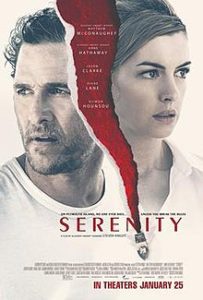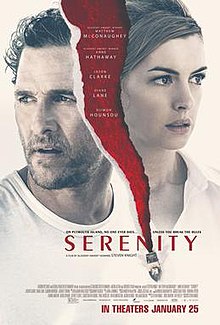Serenity
Posted on January 24, 2019 at 5:34 pm
D| Lowest Recommended Age: | Mature High Schooler |
| MPAA Rating: | Rated R for language throughout, sexual content, and some bloody images |
| Profanity: | Constant very strong language |
| Alcohol/ Drugs: | Drinking and drunkenness, smoking |
| Violence/ Scariness: | Peril and violence, domestic abuse, murder |
| Diversity Issues: | None |
| Date Released to Theaters: | January 25, 2019 |
| Date Released to DVD: | May 1, 2019 |

Even by the very low standards of January movies, “Serenity” is a dreary, dumb mess that makes the ultimate mistake of thinking it is smart.
At first, it wants us to think it is a throwback to the classic twisty noir thrillers like “Out of the Past” and “The Lady from Shanghai.” Matthew McConaughey plays a man called Baker Dill (note: I did not say a man named Baker Dill), a veteran who lives on remote Plymouth Island, where he takes out feckless tourists on a fishing boat called Serenity. We glimpse a Purple Heart medal in the corrugated metal shack where he lives, and we can see that he is bitter and struggling with psychological damage and maybe some physical damage as well. There’s a World’s Greatest Father mug in the shack as well. He pours his whiskey into it. Dill has an Ahab-like fascination with a giant tuna he has named….Justice. And he has a relationship with a local woman (Diane Lane, slumming), who pays him to “find her cat,” which is both literal and euphemistic. Same with the only bar on the island, which used to have Hope in its name but then switched to Rope. This is not a subtle movie. We also see a mysterious, very proper, precise man in a suit who carries a briefcase (Jeremy Strong), who seems to be looking for Dill. At one point, he removes his shoes to wade robotically across a stream.
And then, the second act complication arrives: femme fatale Karen (Anne Hathaway), honey blonde hair and dressed in white. She is married to Frank (Jason Clarke), a wealthy boor who abuses her and terrifies her son, who is Dill’s son as well. She says Frank will kill her if she tries to leave him, so the only way to protect her is to get Frank drunk out at sea and throw him to the sharks. If Dill will do that, he will not only save his son, but he will get $10 million in cash.
There are some hints that this is not the usual thriller story of seduction, betrayal, and murder, though all of those elements are there. Something is a little off, though. Dill has some sort of mystical mental Skype thing going with the son he has not seen in ten years. Where is Plymouth Island? The music is Cajun and there are references to Miami but it is becomes increasingly clear that it is strangely isolated and insular. “Everyone knows everything,” we hear repeatedly. At first, it seems to refer to the gossip in any tiny community. But then we begin to wonder “What is Plymouth Island?” when it goes from “everyone knows everything” about the details of what Dill is buying and selling and catching and where he is at all times to “no one knows anything” when it comes to the choices Dill is facing and how he will decide. The best way to enjoy this film is to have a drinking game that lets you take a swig every time a character says either line.
The four leads do their best to persuade us that their stilted dialogue and increasingly artificial interactions are archetypal, not underwritten, but they never find a tone that will withstand the groaner of a twist, which I will be happy to spoil per my legendary Gothika rule*. Trust me, it’s a worthy addition.
*Gothika Rule: If is movie has a truly bad or dumb ending, I will happily give it away to anyone who sends me an email at moviemom@moviemom.com.
Parents should know that this film includes domestic abuse, murder, characters injured and killed, some disturbing images, very strong language, explicit sexual situations, nudity, drinking and drunkenness, and smoking.
Family discussion: In what way did “everybody know everything” and in what way did “nobody know anything?” What were the clues that things were not what they seemed?
If you like this, try: “Out of Time,” “Body Heat,” “The Lady from Shanghai,” and “The Cafe”

